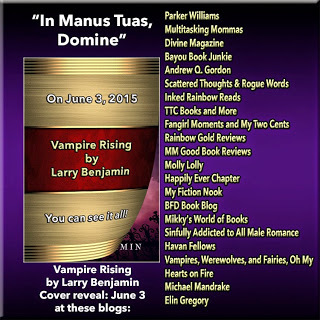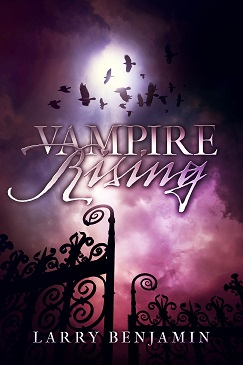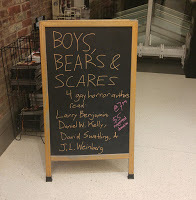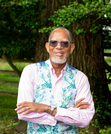Larry Benjamin's Blog: Larry Benjamin's blog - This Writer's Life - Posts Tagged "vampire-rising"
The Vampire Rises

If you follow me on Twitter or read this blog regularly you probably know I have a new book coming out this summer: Vampire Rising. It’s a novella, actually. We will be revealing the cover on June 3, the same day the book becomes available for pre-ordering. See the graphic on the left for a list blogs where you can see the cover, and read the first excerpt.
Read the full post here.
Published on May 26, 2015 07:19
•
Tags:
larry-benjamin, vampire-rising, vampires
He Has Risen: Cover Release & Giveaway for Vampire Rising

Today is the day. We've revealed the cover and first excerpt for my novella, Vampire Rising. There’s also a giveaway of all three books from my backlist. You can check it out on my multi-blog Cover Reveal Tour starting here.
Vampire Rising will officially release on July 19, 2015 but if you pre-order now, you can get it for just 1.97 USD (eBook).
Published on June 03, 2015 14:01
•
Tags:
fantasy, gay-fiction, giveaway, larry-benjmain, lgbt, urban-fantasy, vampire-rising, vampires
The Making of a Book Trailer

When we released my allegorical Vampire novella, Vampire Rising, in July, I quickly realized I wanted to create a book trailer for it. To make a book trailer I knew I had to meet a new challenge—I’d already told the story—but for the video I needed to retell it. Visually. This was the challenge. I am a story teller: in my day job I tell stories; if you’ve ever met me in person and spoken to me you will, no doubt, remember I am prone to telling stories; as a writer, I tell stories. But for my writing life, I focus on the words—the words for me are as important as the story itself. I want to use the right words, to define a mood, to capture the rhythms I hear it in my head.
Having written four books, I’m fairly confident in my voice but I knew I’d have to rely on images and actions, rather than words, to tell the story. The story’s main premises are simple enough: “history repeats itself,” and “people are people.” The story is told in certain colors: purple and gray and silver and black and white are the predominate colors. The main elements are an elaborate wrought iron gate and mockingbirds. We managed to capture these for the book’s cover. But how could I replicate that on video?
Continue reading this post here.
Published on August 13, 2015 11:14
•
Tags:
fantasy, larry-benjamin, lgbt, vampire-rising
Why Queer Romance Matters…It’s Personal
I was asked to be a write a guest post for Queer Romance Month, which I gladly did. It was originally posted on Day 2, Friday Oct 2, on the Queer Romance Month blog.
The feedback and comments the post received encouraged me to share it here.
I read. A lot. And I collect books. I have nearly 3,000. Many are classics—Fitzgerald, Wells, Dickens, the Brontés. Virginia Wolfe. But many more are contemporary gay fiction ranging from newer, lesser known writers to the literary lions of gay literature: Felice Picano, Mark Merlis, E.M. Forster, Baldwin, Burroughs (William, not Augusten), Alan Hollinghurst, William J. Mann, David Leavitt.
The first queer novel I read was Patricia Nell Warren’s "The Front Runner." I remember finding it at the book store at Penn freshman year. My roommates, who were on the track team, were at an away meet that weekend. I read the entire book before they returned, barely stopping to sleep and eat. I read "The Fancy Dancer," too. But it was "The Front Runner" that started me on the pursuit of queer fiction. From then on I read queer romance and queer fiction almost exclusively.
I was hungry for stories about people like me. In retrospect some of my choices make me blush in embarrassment—Gordon Merrick comes to mind—but back then queer books weren’t so easy to find. And I needed queer stories. Even if the stories weren’t really about me. They seldom had any people of color or anyone who wasn’t spectacularly good looking or outrageously “hung.” Reading, I would superimpose myself, my experiences, over each of those author’s texts—much like I’d done when the only GI Joe dolls available were white.
In discovering queer fiction, I had discovered I was not alone; I could finally visualize a life lived with a beloved man at my side. I was truly grateful to the gay authors who had the courage to tell queer stories. But I was increasingly frustrated with the white homo-normative narrative. Where my stories, the stories of our brothers and sisters who were other, who were outside, should have been, there was only silence.
But those queer stories also needed to be told. They were a part of our larger queer stories. We need stories that reflect the spectrum of our lives and loves. We need stories of queer men who find love and romance even if they aren’t handsome or hung or white. That said I don’t believe there are black stories and white stories, there are just stories but I do believe that no one in the queer community should be marginalized or invisible—in life or in literature.
There are no black stories. There are no white stories. There are just stories. Queer stories matter because they allow us to share our lives, to show the world we varied, we are different but not so different, not really. The value is in allowing us—each of us—to see queer selves, our differences, celebrated and reflected.
You can read the original post, or leave a comment to enter to win a copy of Unbroken, or Vampire Rising here
The feedback and comments the post received encouraged me to share it here.
I read. A lot. And I collect books. I have nearly 3,000. Many are classics—Fitzgerald, Wells, Dickens, the Brontés. Virginia Wolfe. But many more are contemporary gay fiction ranging from newer, lesser known writers to the literary lions of gay literature: Felice Picano, Mark Merlis, E.M. Forster, Baldwin, Burroughs (William, not Augusten), Alan Hollinghurst, William J. Mann, David Leavitt.
The first queer novel I read was Patricia Nell Warren’s "The Front Runner." I remember finding it at the book store at Penn freshman year. My roommates, who were on the track team, were at an away meet that weekend. I read the entire book before they returned, barely stopping to sleep and eat. I read "The Fancy Dancer," too. But it was "The Front Runner" that started me on the pursuit of queer fiction. From then on I read queer romance and queer fiction almost exclusively.
I was hungry for stories about people like me. In retrospect some of my choices make me blush in embarrassment—Gordon Merrick comes to mind—but back then queer books weren’t so easy to find. And I needed queer stories. Even if the stories weren’t really about me. They seldom had any people of color or anyone who wasn’t spectacularly good looking or outrageously “hung.” Reading, I would superimpose myself, my experiences, over each of those author’s texts—much like I’d done when the only GI Joe dolls available were white.
In discovering queer fiction, I had discovered I was not alone; I could finally visualize a life lived with a beloved man at my side. I was truly grateful to the gay authors who had the courage to tell queer stories. But I was increasingly frustrated with the white homo-normative narrative. Where my stories, the stories of our brothers and sisters who were other, who were outside, should have been, there was only silence.
But those queer stories also needed to be told. They were a part of our larger queer stories. We need stories that reflect the spectrum of our lives and loves. We need stories of queer men who find love and romance even if they aren’t handsome or hung or white. That said I don’t believe there are black stories and white stories, there are just stories but I do believe that no one in the queer community should be marginalized or invisible—in life or in literature.
There are no black stories. There are no white stories. There are just stories. Queer stories matter because they allow us to share our lives, to show the world we varied, we are different but not so different, not really. The value is in allowing us—each of us—to see queer selves, our differences, celebrated and reflected.
You can read the original post, or leave a comment to enter to win a copy of Unbroken, or Vampire Rising here
Published on October 09, 2015 12:55
•
Tags:
larry-benjamin, lgbt, queer, romance, unbroken, vampire-rising
A Reading Teaches Me Something

I did a reading at the Bureau of General Services - Queer Division on Friday night. My friend and fellow author David Swatling, invited me to join him, Daniel W. Kelly, and J.L. Weinberg, at the reading featuring horror and suspense fiction in recognition of Halloween.
When I arrived, late after a nerve-wracking and slow moving drive down the Henry Hudson Parkway from the Bronx, I discovered my third book, Unbroken, would be on display along with my allegorical Vampire novella, Vampire Rising. I immediately recognized I faced a two-fold challenge: how to present a horror novel that really wasn’t a horror novel at all, and, two, how to tie to very different books together.
I read third. While awaiting my turn, I wrote an intro for myself and pulled a reading from Unbroken. What follows is an excerpt from my reading.
“For me, when I think of horror, I think the true horror is how we sometimes treat each other—especially those who are different from us.
“I’ll be reading from Vampire Rising and Unbroken, tonight. These two readings focus on “first looks”—you know, that moment when we see someone and looking at them reveals something about them—or about us.”
The first scene I read was from Vampire Rising. Barnabas, a 25-year-old encaustic painter goes to a party at the home of his former teacher, Gatsby Collins, a 400-year-old closeted Vampire. In this scene there comes a moment when the closet door opens a crack:
It was in the music room, then, that Barnabas saw Gatsby for the first time since graduation some seven years before. Barnabas paused to let his eyes adjust to the room’s dimness, for his night vision was poor. It was a room of pearl grays and faded gold damask, dark wood and darker carpets, all shadowed in flickering candlelight. Gatsby was seated at an ebony nine-and-a half foot Bosendorfer Concert grand piano—the one with ninety-five keys, rather than the standard eighty-eight—which dominated the room. Gatsby himself had a pewter finish: silvery hair swept back, eyes like pieces of ice, pale cheekbones that gleamed. He was cool and pale, champagne in an ice bucket. Playing selections from “A Chorus Line” for a crowd of stalwart admirers, he was radiant in that darkened room. He was gorgeous and charismatic, a charmer of snakes and men.
He looked up and, seeing Barnabas in the doorway, gasped, for Barnabas was as beautiful as he’d remembered: his caramel skin glowed with youth and vigor. His wide, innocent eyes were clear and his dark hair was cropped short; gone was the defiant retro Afro he’d worn in high school. Staring at him, the frisson of lust and love that shot through him caused Gatsby to miss a note, and frown. He bent over the keyboard; his face dipped into shadow, dissolving into triangles of violet and purple.
To Barnabas, Gatsby looked exactly as he had when he had been his teacher seven years before, and yet he seemed more glamorous; he looked like a 1930s film star perfectly preserved on silver nitrate.
Barnabas, unsure, started to walk across the room to where Gatsby sat at the piano. Gatsby, without taking his eyes off Barnabas, rose and, closing the piano’s lid, murmured something to his audience, who turned to watch Barnabas. Keeping his gaze on Barnabas, Gatsby drifted over, bringing with him sepia tones and a martini.
“Hello, Barnabas,” Gatsby whispered. A smile, fragile as tissue paper, wrapped around his words. He offered his hand like an argentine gift of inestimable value. Barnabas took his hand shyly and murmured back, “Hi, Mr. Calloway.”
“Please! We’re no longer in high school. I’m no longer your teacher. Call me Gatsby.”
Barnabas nodded. “Gatsby.” He’d always addressed him as Mr. Calloway, but he thought of him, in his head, as Gatsby. Still, saying his name aloud sounded strange to his ears but he liked the way the syllables felt in his mouth: Gats-by.
“Ah. That’s better.” The room was cool and Barnabas shivered. “You’re cold,” Gatsby said, taking his arm. There was something antique about him. Heightening the effect was the way he treated Barnabas—with a certain genteel courtliness that in itself seemed of a different age. Indeed Barnabas noticed most of the men in the room exhibited a similar old world mannerliness. “Come, let us sit by the fire.” Gatsby gestured for Barnabas to sit. As Barnabas sank into a worn leather club chair, Gatsby placed his martini glass on a passing waiter’s tray and took from it two fresh Martini glasses. “A Vesper martini, tonight’s signature cocktail,” he explained handing one to Barnabas. “Two more,” he said to the waiter before sitting in the chair opposite Barnabas.
Gatsby smiled and it was then that Barnabas saw the canine teeth. He’d suspected it but still he jumped a little. Gatsby noticed the tremor that passed through Barnabas. He stopped smiling and stared into the middle distance as firelight played over his features, painting them now pink, now pearl. After a moment the tension passed and they continued as before.
The second scene is from Unbroken and centers on the moment in a young Lincoln’s life. An undeniable sissy, he announces at age 6 that he will marry his best friend a boy. His parents go to great lengths to “fix” him and almost convince him that he is mistaken, that he will change…
I was twelve, and in seventh grade. He was the new kid. His name was Jose Calderon. He walked into fourth period music, smiled, and changed everything. Until that moment, I had believed their lies, had ignored my own truth. I would change they told me, just wait and see. I would want to marry a girl, have children, and a dog, and a split-level house in the suburbs just like on The Brady Bunch because that’s what all boys wanted when they grew up and left childish things behind. Time, they said, would fix me, and I’d feel as other boys felt. Time had passed and I was still…broken.
As I was leaving, I was mentally going over all the things I did wrong, could have done better. I should have done a better job of setting up each scene but at the time I just wanted to plunge the audience into the middle of the story which is reflective of my books in general—I just drop the reader into the thick of things and help them piece the story together. Normally I memorize what I will read but this week I hadn’t had time and then I switched passages at the last minute. I should have been better prepared I chided myself.
Two men, also on their way out,stopped mean, and momentarily silenced the critical voices in my head. I recognized them because they had sat in the front row to my right. As I read I found myself glancing at them because they kept smiling and nodding and I felt reassured by their presence. They told me they just wanted to thank me for reading and tell me how much they’d enjoyed what I’d read. One of them said he really liked my shirt. I thanked him and confessed that I’d been upset because the valet at the garage had driven off before I could retrieve from the backseat the blazer I’d planned to wear. “Well I’m glad,” he said, “Because I got to see more of that great shirt.”
And that’s when it hit me—sometimes things don’t go according to plan, things change and the last minute and you have to adapt. It is in the adaptation that we soar.
Published on November 01, 2015 15:19
•
Tags:
david-swatling, larry-benjamin, lgbt, unbrokenn, vampire-rising, vampires
Larry Benjamin's blog - This Writer's Life
The writer's life is as individual and strange as each writer. I'll document my journey as a writer here.
The writer's life is as individual and strange as each writer. I'll document my journey as a writer here.
...more
- Larry Benjamin's profile
- 126 followers



